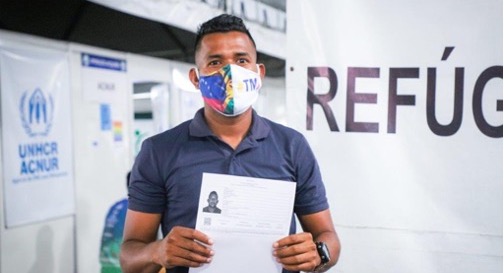
A 25-year-old indigenous Warao Venezuelan refugee awaits an information session in the northern border city of Pacaraima having been advised of his rights as a result of his prima facie refugee recognition © UNHCR/Allana Ferreira
Snapshot
Entities sharing this good practice: National Committee for Refugees (Conare) within the Ministry of Justice and Security
Submitted by: Bernardo de Almeida Tannuri Laferte, CONARE General-Coordinator together with Federico Martinez and Christina Asencio, UNHCR Brazil
Key stakeholders: UNHCR Brazil
Visit their website: https://www.acnur.org and https://www.justica.gov.br/seus-direitos/refugio/conare as well as a dashboard on Conare recognitions
Asylum claims in Brazil are assessed by the National Committee for Refugees (Comitê Nacional para os Refugiados – Conare), within the Ministry of Justice and Public Security.
In June 2019, Conare recognized the situation in Venezuela amounted to one of serious and generalized human rights violations, a finding permitted under the broader refugee criteria contained in the 1997 Brazilian Refugee Protection Act which incorporates elements of the regional 1984 Cartagena Declaration on Refugees. This finding was made upon evaluation of a 25-page technical note (available here) prepared by Conare’s General-Coordination on country conditions in Venezuela, recommending that Conare adopt simplified procedures for prima facie recognition of refugee claims submitted by Venezuelans based on a presumption of inclusion.
Also in June 2019, Conare issued normative resolution nº 29 (14 June 2019) (available here) which establishes use of Sisconare, an online system for the registration and processing of asylum claims in Brazil, and authorizes the establishment of accelerated or simplified procedures with the possibility to dispense of an eligibility interview in manifestly founded claims.
In implementing its resolution nº 29, in December 2019, Conare endorsed a technical note (available here) prepared by the General-Coordination setting out simplified procedures for manifestly founded claims submitted by Venezuelan asylum-seekers dispensing with the need for an eligibility interview in situations where an applicant satisfies several criteria, including:
1. An official entry to Brazil (aimed at establishing presence in the country);
2. Possession of a Venezuelan national identity document or passport, regardless of the document’s expiration date, in establishing Venezuelan nationality;
3. Lack of a criminal record in Brazil;
4. Be 18 years of age or older; and
5. Not be in possession of a migratory residence in Brazil.
The first above-mentioned criterion was originally applied by Conare to applicants who have had one official entry to Brazil but was later extended to include applicants who have had no more than two official entries to Brazil, ensuring that the last migratory movement was an entry in attesting to the applicant’s presence in Brazil. Applicants who are unable to satisfy the above criteria are eligible to undergo a simplified eligibility interview.
The finding that the situation in Venezuela amounts to one of serious and generalized human rights violations is valid for a minimum period of 12 months, with the possibility to reassess based on a reevaluation of country conditions or amend upon a factual change in country circumstances. Accordingly, in August 2020 Conare extended its finding of serious and generalized human rights violations to Venezuela until August 2021 for reassessment then (available here).
The December 2019 technical note also sets out the indispensability of verifying individuals who do not merit international protection, in accordance with Article 3º of refugee Law nº 9.474, from 22 of July 1997, and states that refugee protection under the Cartagena Declaration is not applicable to applicants who belong to Colectivos or Megabandas among other urban guerrilla groups, or that in any way obtained material benefit from the circumstances in Venezuela.
In December 2019, upon endorsement of these criteria, some 21,000 Venezuelan asylum-seekers were granted refugee protection receiving immediate relief.
As of today, over 46,000 Venezuelans have been recognized as refugees thanks in great part to the simplified prima facie processing modality – the largest Venezuelan refugee recognition by any Latin American government in line with Brazil’s historical leadership in refugee protection.
Through this simplified procedure, Conare is able to provide Venezuelan asylum-seekers with a fair and fast decision. Conare works closely with the Federal Police in verifying whether an asylum-seeker satisfies the five above-mentioned criteria ensuring the integrity of the procedure.
Conare continues to advance in its processing of Venezuelan asylum claims, including for individuals who do not satisfy the five criteria under which to dispense with an eligibility interview, such as persons who lack a national identity document or passport.
Many indigenous Venezuelan asylum-seekers indicate not being able to comply with this requirement. To this end, in December 2020, the General-Coordination of Conare conducted an eligibility mission to Brazil’s northern border with Venezuela, the principal entry point for Venezuelans. Eligibility officers conducted simplified interviews with indigenous Venezuelans focused solely on establishing nationality and/or habitual residence in Venezuela given Conare’s recognition that the situation in Venezuela amounts to one of serious and generalized human rights violations, and its presumption of inclusion for Venezuelan applicants.

Recent Comments